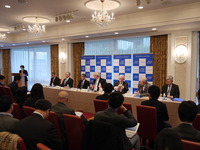Regular
[Press Release] Alliance Commission Calls for Enhanced U.S.-Japan Ties
Today, the U.S.-Japan Commission on the Future of the Alliance released its final report: "The U.S.-Japan Alliance to 2030: Power and Principle." In 2013, the Sasakawa Peace Foundation and the Center for Strategic and International Studies established a bilateral commission of distinguished policymakers and scholars to develop a shared vision for Asia and the U.S.-Japan Alliance through 2030. The Commission proposes a shared vision for the world that the United States and Japan seek in the next 15 years, including a world in which all nations are secure, peaceful, prosperous, and free. The Commission's report, which includes policy recommendations for enhancing bilateral security ties, can be downloaded here.
Key recommendations include:
-
To address China's rise, the Commission recommends that the United States and Japan develop a coordinated China strategy. The coordinated strategy for China that the Commission proposes includes four components: better-integrated American and Japanese policy towards China; realistic economic relations with China; stronger combined military capability; and more effective counters to Chinese aggression in the East and South China Seas.
-
To deepen the Alliance and address increasingly complex security challenges, the United States and Japan will have to develop a more integrated Alliance capable of making rapid decisions. In the Commission's view, five steps are necessary: increasing strategic dialogue and coordination across the two governments; establishing and substantiating the Alliance Coordination Mechanism; updating command and control mechanisms; further strengthening interoperability between Japanese and U.S. forces; and promoting defense industrial cooperation.
-
To broaden the Alliance, the Commission recommends that the United States and Japan at least coordinate, and if possible integrate, their policies and actions elsewhere in Asia and beyond. Doing so can increase the effectiveness of both Allies in achieving shared objectives and can support their vision of the world in 2030. The Commission makes specific recommendations in a number of geographic areas (including the Korean Peninsula, Southeast Asia, Russia and the Arctic, and Australia and India) as well as functional areas (such as counterterrorism, cybersecurity, space, climate change, the environment, energy, and the United Nations).
-
To sustain the Alliance and maintain public support, it will be important to continue to solve, or even better to anticipate, basing issues and to establish basing arrangements that minimize areas of friction. The commission proposes four elements to better sustain the Alliance and to gain stronger public support: building on shared common values; accelerating the relocation of U.S. forces on Okinawa; addressing environmental and legal issues related to U.S. forces stationed in Japan; and building human resources as a foundation for long-term ties.
Japanese Commissioners |
|
| Jiro Hanyu | Chairman, The Sasakawa Peace Foundation |
| Ryozo Kato | former Ambassador of Japan to the United States (Co-Chair) |
| Masashi Nishihara | President, Research Institute for Peace and Security |
| Yukio Okamoto | President, Okamoto Associates |
| Ryouichi Oriki | former Chief of Staff, Joint Staff |
| Koji Tanami | former Administrative Vice Minister, Ministry of Finance; former President, Japan Bank for International Cooperation |
| Noboru Yamaguchi | Professor, International University of Japan Research Institute; Advisor, The Sasakawa Peace Foundation |
U.S. Commissioners |
|
| Richard Armitage | President, Armitage International L.C.; CSIS Trustee (Co-Chair) |
| Dennis C. Blair | CEO and Chairman of the Board, Sasakawa Peace Foundation USA |
| Aaron Friedberg | Professor of Politics and International Affairs, Princeton University |
| Michael Green | Senior Vice President for Asia and Japan Chair, CSIS; Chair in Modern and Contemporary Japanese Politics and Foreign Policy, Georgetown University |
| John Hamre | President, CEO, and Pritzker Chair, CSIS (Co-Chair) |
| Joseph Nye Jr. | University Distinguished Service Professor, John F. Kennedy School of Government, Harvard University; CSIS Trustee |
Reports
- ˙ Final Report Executive Summary (English ver.)
- ˙ Final Report (English ver.)
- ˙ Final Report Executive Summary (Japanese ver.<Text Editing>)
- ˙ Final Report (Japanese ver. <Text Editing>)
Project Name
Research Project on Future Japan-U.S. Security Cooperation
